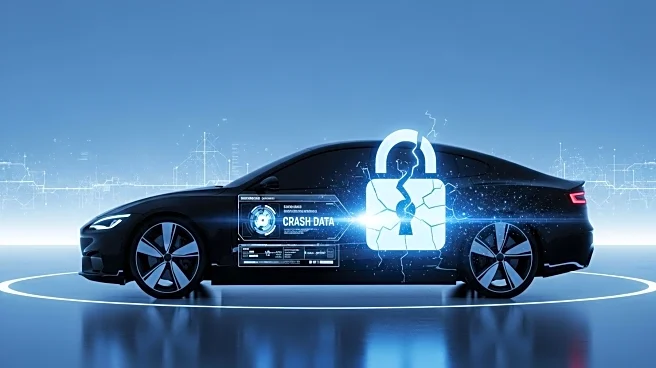What's Happening?
In a landmark case, Tesla has been ordered to pay $243 million in damages after a hacker uncovered crucial data related to a fatal crash involving its Autopilot technology. The incident occurred in 2019 when a Tesla vehicle, operating on Autopilot, collided with a couple in Florida, resulting in the death of Naibel Benavides Leon and severe injuries to her boyfriend, Dillon Angulo. Tesla initially claimed it did not possess the data necessary for the wrongful death lawsuit filed by the victims' families. However, a hacker, known online as @greentheonly, managed to retrieve the data from the vehicle's Autopilot control unit, which became pivotal evidence in the trial. The jury found Tesla 33% liable for the crash, marking a significant setback for the company, which has often argued that drivers are responsible when its technology is involved in accidents.
Why It's Important?
The verdict against Tesla highlights the growing scrutiny of its Autopilot technology and the company's handling of crash data. This case sets a precedent for future litigation involving autonomous driving systems, potentially impacting Tesla's reputation and financial standing. The decision underscores the importance of transparency and accountability in the deployment of advanced driver-assistance technologies. It also raises questions about the ethical responsibilities of companies in ensuring the safety and reliability of their products. The outcome may influence ongoing and future lawsuits against Tesla, as well as regulatory actions concerning autonomous vehicle technologies.
What's Next?
Tesla plans to appeal the verdict, citing substantial errors of law and irregularities at trial. The company has requested the court to either overturn the decision or order a new trial. Meanwhile, the verdict is expected to bolster other pending cases against Tesla, including a shareholder lawsuit in Texas alleging fraud related to its autonomous driving technology. Additionally, similar cases are anticipated to go to trial in the coming years, potentially leading to further legal challenges for Tesla. The company's approach to handling crash data and its defense strategies will likely be scrutinized in these upcoming trials.
Beyond the Headlines
The case raises broader questions about the role of hackers in uncovering critical information in legal disputes, particularly when companies fail to provide necessary data. It also highlights the potential for technology to both aid and complicate legal proceedings, as well as the ethical implications of data management and privacy in the context of autonomous vehicles. The involvement of a hacker in retrieving the data points to the challenges faced by plaintiffs in accessing information that could be crucial to their cases.










